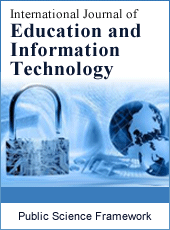International Journal of Education and Information Technology
Articles Information
International Journal of Education and Information Technology, Vol.4, No.1, Mar. 2019, Pub. Date: Jul. 7, 2020
School Climate, Academic Achievement and Student’s Personal Factors as Correlates of Interest in Schooling Among Undergraduates of University of Ibadan, Nigeria
Pages: 9-16 Views: 2092 Downloads: 775
[01]
Olubukola Adesola Oyebanji, Department of Educational Management, University of Ibadan, Ibadan, Nigeria.
This study examined school climate, academic achievement and student’s personal factors as correlates of interest in schooling among Undergraduates of University of Ibadan, Nigeria. Descriptive survey research design was adopted and structured copies of questionnaire were used to gather data. The study adopted multistage sampling procedure to select two hundred (200) undergraduates in University of Ibadan who participated in the study. The result revealed that school climate, academic achievement and students' personal factors had significant joint influence on interest in schooling (F(7,192) = 18.331; p<0.05), and out of school climate, academic achievement and students' personal factors (level of study, gender, age, religion and family background), school climate and academic achievement have significant independent influence on interest in schooling (=-0.234; t = -5.942; p<0.05. =0.497; t = 8.138; p<0.05. =0.266; t = 4.377; p<0.05) among Undergraduates of University of Ibadan, Nigeria. The study concluded that there was significant relative and joint influence of school climate and academic achievement on interest in schooling among Undergraduates of University of Ibadan, Nigeria. Therefore, it was recommended that University council and authority, counseling psychologists, educational administrators and parents should take cognisance of academic achievement and school climate in the development of any intervention to assist undergraduates with low or no interest in schooling.
School Climate, Academic Achievement, Student’s Personal Factors, Interest in Schooling
[01]
Vickey I. Thomas. (2013). Exploring students' perceptions of their interest/ lack of interest in academic work at a five year government secondary school in south Trinidad. Unpublished project.
[02]
Hidi, S. (1990). Interest and its contribution as a mental resource for learning. Review of Educational Research, 60, 549–571.
[03]
Ainley, M., Hidi, S., & Berndorff, D. (2002). Interest, learning, and the psychological processes that mediate their relationship. Journal of Educational Psychology, 94, 545–561.
[04]
Hidi, S., & Renninger, K. A. (2006). The four-phase model of interest development. Educational Psychologist, 41, 111–127.
[05]
Bernstein, D. A., Penner, L. A., Clarke-Stewart, A. & Roy E. J. (2006). Psychology (7th ed) Boston M. A. Houghton Mifflin Company.
[06]
Williams, J. D. (2000). Student engagement at school: A sense of belonging and participation. Organization for Economic Co-operation and Development. Retrieved September 20, 2014 from www.oecd.org/.../school/programmeforinternationalstudentassessmentpis.
[07]
Omoruyi. I, V (2014), Influence Of Broken Homes On Academic Performance And Personality Development Of The Adolescents In Lagos State. European Journal of Educational and Development Psychology Vol. 2, No. 2, pp. 10-23, September 2014.
[08]
Akinboye, J. O. (2006). Definitions of Emotional Intelligence from Creativity Paradigm. CYFO Behavioral Services. Department of Guidance and Counseling, University of Ibadan, Ibadan.
[09]
Epunam, L. C. (2015). Influence of school environmental variables on academic performance as perceived by students. Unpublished M. Ed Thesis. University of Nigeria, Nsukka.
[10]
Fadokun, J. B. (2009). University research capacity in Nigeria and the challenges of National development in a knowledge-based economy. National Institute for Educational Planning and Administration, Nigeria.
[11]
Freiberg, H. J. (Ed). (1999). School climate: Measuring, improving, and sustaining healthy learning environments. Philadelphia: Falmer Press.
[12]
Welsh, W. N. (2000). The effects of school climate on school disorder. The ANNALS of the American Academy of Political and Social Science, 567 (January), 88-106.
[13]
Cohen, J. (2009). Transforming school climate: Educational and psychoanalytic perspectives. An introduction to a special issue on school climate. Schools: Studies in Education, 6 (1), 99-103.
[14]
Kuperminc, G. P., Leadbeater, B. J., & Blatt, S. J. (2001). School social climate and individual differences in vulnerability to psychopathology among middle school students. Journal of School Psychology, 39 (2), 141-159.
[15]
Manning, M. L., & Saddlemire, R. (1996). Developing a sense of community in secondary schools. National Association of Secondary School Principals. NASSP Bulletin, 80 (584), 41-48.
[16]
Freiberg, H. J. & Stein, T. A. (1999). Introduction to School climate: Measuring, improving, and sustaining healthy learning environments. Philadelphia, PA: Falmer Press.
[17]
Hoy, W. K. & Miskel, C. G. (2001): Theory, Research and Practice. Retrieved from http://www.academicus.edu.al/nr8/Academicus-MMXIII-8-110-125.pdf on 15/2/15.
[18]
Hoy, W. K. & Sabo, D. J. (1998). Open and Healthy. Retrieved from http://www.academicus.edu.al/nr8/Academicus-MMXIII-8-110-125.pdf on 15/2/15.
[19]
Thapa A., Cohen J., Guffey S., Higgins-D'Alessandro A. (2013). A review of school climate research. Rev. Educ. Res. 83, 357–385.
[20]
Astor, R. A., Guerra, N., & Van Acker, R. (2010). How can we improve school safety research? Educational Researcher, 39, 69–78. doi: 10.3102/0013189X09357619.

ISSN Print: 2381-7410
ISSN Online: 2381-7429
Current Issue:
Vol. 5, Issue 1, March Submit a Manuscript Join Editorial Board Join Reviewer Team
ISSN Online: 2381-7429
Current Issue:
Vol. 5, Issue 1, March Submit a Manuscript Join Editorial Board Join Reviewer Team
| About This Journal |
| All Issues |
| Open Access |
| Indexing |
| Payment Information |
| Author Guidelines |
| Review Process |
| Publication Ethics |
| Editorial Board |
| Peer Reviewers |


